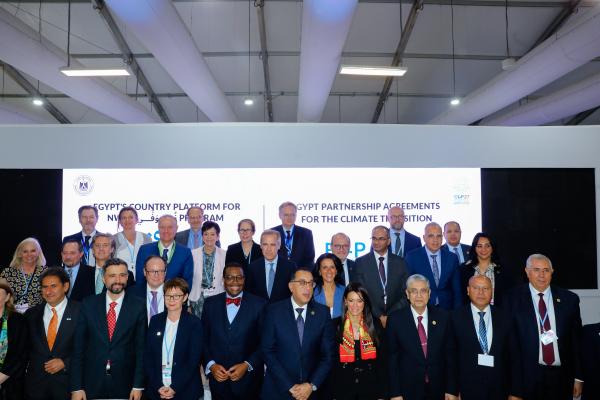
The European Investment Bank (EIB) and the EIB Group as a whole has been working closely with the Egyptian Presidency of COP27 to offer its support both as chair of the world’s Multilateral Banks and to do its part to make sure that this COP is – as the Egyptian Presidency put it – a COP of implementation.
The COP27 offered an opportunity for the EIB to cement cooperation and joint projects, including newly announced cooperation with Egypt in financing the Nexus on Food, Water and Energy (NWFE) programme pillars. As well as this the European Investment Fund – part of the EIB Group – announced new financing aimed at supporting EUR 2.5 billion of climate action investment.
At COP27, the EIB, declared its support for new investments in several sectors namely energy, transport, water and agriculture adaptation, signing a number of partnership agreements and letters of intent with the government of Egypt to finance projects of the National Platform for Green Projects - the NWFE programme.
The signing ceremony was officiated by Dr. Mostafa Madbouly, Egypt’s Prime Minister, and Dr. Rania Al-Mashat, Minister of International Cooperation, with minsters of Electricity and Renewable Energy, Transport, Environment, Resources Water and Irrigation, Agriculture and Land Reclamation, Housing, all also present for the ceremony . The EIB joined other representatives of development partners from international finance institutions.
At COP, to the EIB confirmed its intention to support Egypt’s green and sustainable transition, while also contributing to the country’s resilience to climate change over the period 2022-2030, including renewable energy projects, transport projects, water and food security projects.
In the water sector, the EIB has already supported investment with more than EUR 1bn in 13 projects in water and wastewater across Egypt. As well as this, new investments of some EUR 400m will be dedicated to the sector to improve access to drinking water, and recycle the wastewater in the framework of the NWFE programme, while also promoting energy efficiency – as EIB Vice President Gelsomina Vigliotti said, “Each time I travel to this region, I am reminded water is life. The scarcity of water really affects people’s daily lives and in this regard we can do a lot. EIB is the major financier of water projects worldwide.”
Egypt’s transport sector is one of the most significant sectors for investment by the EIB, for example through support for the Cairo Metro, which has benefitted from EIB support including upgrading the first and second phases of the metro, and providing funding worth EUR 600m for phase 3.
The EIB also announced EUR 221 million of new financing to support upgrading the 119km railway between Tanta and Damietta. The 25-year EIB loan will finance the modernisation of what is Egypt’s second busiest railway increasing passenger and freight capacity, improving speed and enhancing safety through installation of new signalling systems.
To contribute to the challenge of food security in Egypt, the EIB is currently working on projects that contribute to agriculture adaptation, climate action and environmental sustainability objectives. This will support Egypt in building resilience to food shortages due to climate change or to food price spikes, by helping to increase and modernise the country’s cereal storage and logistics infrastructure.
Minister of International Cooperation, H.E. Dr. Rania Al-Mashat, said, “ The Arab Republic of Egypt provides a model for the world to shift from pledges to the implementation and what can be implemented through national platforms to mobilize climate finance, after the Pational Platform for Green Projects launched the NWFE programme. “
EIB Vice-President Ambroise Fayolle in charge of climate action and development stated, “The Egyptian COP27 Presidency has labelled this the implementation COP. I am delighted that the European Investment Bank is delivering on this by supporting the country’s ambitious National Climate Change Strategy 2050 through investments in green energy, sustainable transport and agriculture and clean water. The signed projects will strengthen Egypt’s resilience to climate change impacts through climate adaptation projects in the water sector as well as climate smart agriculture in the Delta, thereby supporting food security and the well-being of communities on the frontline of climate change.”
Highlighting the importance of NFWE, as a model initiative , EIB Vice President Gelsomina Vigliotti also said “We know that this is one of those parts of the world most affected by climate change. In this regard we very much share the objectives of the COP Presidency to look at implementation. Now the real proof is to deliver what we promised. Egypt is a case where we are working very well. Together with the Presidency and other development banks we are helped them to deliver the NWWE. This nexus of water, food and energy is something which is very relevant for these countries in the region.”
NWFE integrates a set of high priority projects for adaptation and mitigation. These climate action projects includes projects that would replace existing inefficient thermal power plants with renewable energy, enhance small farmers’ adaptation to climate risks, increase crop yields and irrigation efficiency, build resilience of vulnerable regions, develop water desalination capacity, establish early warning systems, and modernize on-farm practices.

